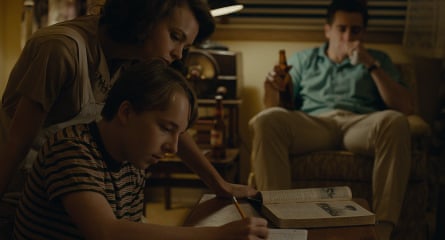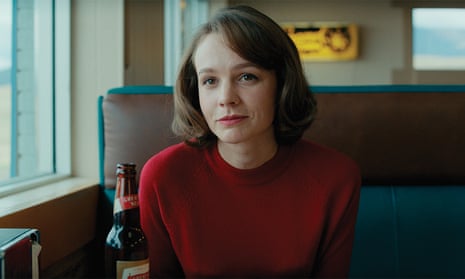This handsomely made, meticulously acted period picture is an impressive directorial debut for Paul Dano – and a triumph for its production designer Akin McKenzie and cinematographer Diego García, who create some soberly beautiful tableaux of postwar American life.
With his partner, the screenwriter and actor Zoe Kazan, Dano has adapted the novel by Richard Ford about Joe, a teenage boy who has moved to a small town in 1950s Montana with his parents. They are on the genteel middle-class poverty line, living from pay cheque to pay cheque, and then to lack of pay cheque. When Joe’s restlessly angry and unemployed dad leaves to take a low-paying job fighting wildfires up in the hills, it ambiguously signals the end of the marriage, and Joe is the intimate witness to his mother Jeanette’s private depression and her courage in facing up to her new life choices.
She treats him like an adult, or like an ersatz husband or best friend, and he is poignantly admitted to what writer Betty Friedan would later call “feminine mystique”. He and we see a gradual change in her – she reverts from the cheerful, respectable wife and mother that he is used to seeing around the house, to the sensual and rebellious young woman that his father originally fell in love with. But all this in a spirit of quiet desperation and caricature, as she begins to weigh up what’s involved in accepting the advances of a wealthy, good-humoured car salesman and war veteran whose own wife has left him.
Jake Gyllenhaal plays Jerry Brinson, the dad, a man who looks permanently gaunt and exhausted, deeply dismayed by his failure to master the American dream or Dale Carnegie-style tricks of achieving popularity and social advancement. When we first see him at work, it seems that he is an assistant at the local golf course, but appears to have calamitously misjudged how up close and personal he is expected to be, actually cleaning the members’ shoes while they are wearing them, an embarrassing servility that jars with his cheery greetings and farewells.
Ed Oxenbould plays Joe, a role that requires what might be considered a series of mute reaction shots, his cherubic face often set in a ruefully suppressed grimace as he impassively sizes up his father’s humiliation and depression and his mother Jeanette’s disappointment with life. Jeanette is played with terrific gusto by Carey Mulligan. It is one of the best roles and best performances, of her career – giving her a chance to display maturity, wit, savvy and the emotional battle scars of life, and taking her away from the rather girlish image in which she has often been confined.

She is a fighter, a smiler, never-say-die-er, but only so long as her husband is prepared to do his part. We see her breezily wave away the issue of a cheque that has bounced at the bank and through sheer persistence get a job as a swimming instructor at the YMCA, a job that allows her to become socially acquainted with a certain adult pupil, her would-be beau, the corpulent, opulent Warren Miller, played by Bill Camp. Once Jerry is off the scene, he invites Jeanette and Joe to dinner at his house. Joe wanders into his bedroom while the grownups are talking and encounters Warren’s leg caliper gruesomely hanging up in the closet, and a hardly less gruesome contraceptive in his nightstand drawer. The relationship takes its course, and it’s Joe who has to get himself to school, get his own meals and wonder what his role is to be in this new fractured family.
It’s an extremely watchable movie, beautifully and even luxuriously appointed in its austere evocation of small-town America – though maybe a little self-conscious in its emotional woundedness. Perhaps the character of Joe himself is its flaw, required to give us nothing much more than wordless dismay or acceptance of everything that is going on. His face is often seen in silent closeup, but the movie does not give us the kind of access to his feelings that we have with Jerry or Jeanette. Joe is, incidentally, working part-time as the assistant to a portrait photographer in town, and Dano periodically gives us nicely observed still images of the customers’ heartbreaking family portraits: a bourgeois-aspiration effect that has been used in Mike Leigh’s Secrets and Lies and Paul Thomas Anderson’s The Master. Dano has given us a satisfying drama of damaged lives.

Comments (…)
Sign in or create your Guardian account to join the discussion